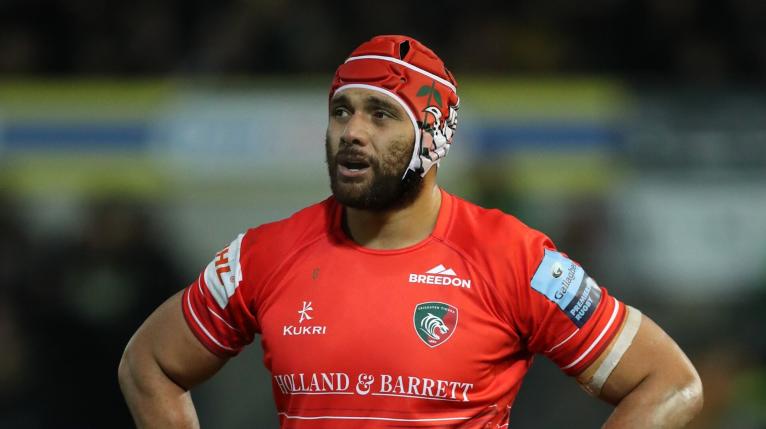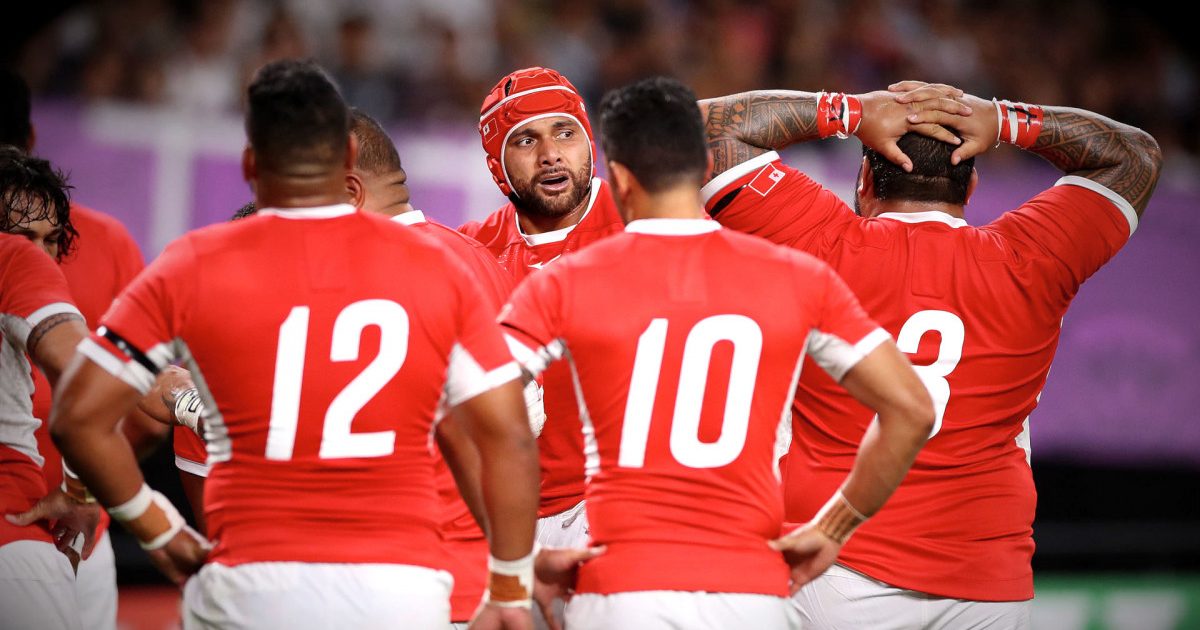'I grew up in a house with no internet. I didn't really know a whole lot about rugby'

The odyssey began many years back, in a house of nine siblings on the Tongan archipelago, and ended this week in a registry office in Carmarthen. Pride swelled in Sione Kalamafoni’s chest and the British national anthem pealed through the room.
After an avalanche of paperwork and form-filling, the Kalamafoni family – the Scarlets number eight, his wife and three young children – were awarded UK citizenship.
A decade since leaving his islands homeland for Nottingham in the English Championship, it was a moment of poignancy, joy and relief.
“Because of Covid-19, it was just me and my family, which made it a little more special,” Kalamafoni told RugbyPass. “We’d rather have had it that way – in and out, just us.
“We went in, said our oath, and repeated after the person conducting the ceremony. They played the national anthem, and then we received our certificates and took a couple of pictures.
“It was something we really wanted when we came here. Not for the first couple of years, because we didn’t really know if we were going to stay, but after that, we decided it might be something we look to get. It’s been a long time coming.
“Most of us Tongans, we try to go overseas for a better life for our families. My parents, most of my family, are in America. It’s not only for us but for our kids, giving them the opportunities and education and healthcare and a brighter future.”
Kalamafoni was raised on the twin pillars of faith and graft. His devout Christian father was a teacher; his mother stayed home and oversaw the terrifying task of feeding, clothing and wrangling her nine children.
“I grew up in a house with no internet,” the 32-year-old continued. “I didn’t really know a whole lot about rugby. I started playing in a team when I was 15, 16 years old. It was a dream for me to be able to play professionally.
“Guys that are playing overseas and coming back to visit the islands are your role models, to be able to go and play and provide for your family. But I didn’t know that I’d be playing professionally for clubs that are up there with the most famous in the world.”
In the beginning, light years from contracts at the storied giants of Gloucester and Leicester, it was church first, rugby second.
At 18, Kalamafoni went to Chicago to work as a missionary. It was a pilgrimage for young men in his congregation, but a mighty jolt from life in Tonga. The two years he spent in America were deeply formative.
“The people of Chicago are very kind,” he said. “Whenever we were around, they’d invite us to have food with them at their barbecues. They would say, ‘Oh, here come the Jesus boys!’”
“We’d wake up in the morning, have a couple of hours of study, then we’d be out the door in twos, and you covered certain areas and just went door to door or talk to people on the street or help the community.

“I was on the West Side of Chicago, part of the city that was rough, and every Tuesday, me and my companion would go and join up with some sisters from the Catholic church at food banks, deliver clothes and food and little things like that.”
It was Glenn Delaney, now in charge at the Scarlets, who first brought Kalamafoni to Britain, where he spent two barnstorming years in the Championship, before being picked up by Gloucester.
A hulking carrier of ball with a heart as big as his biceps, Kalamafoni wowed the Kingsholm Shed, and then Welford Road, the grand old lady of English rugby, when he signed for Tigers.
“Playing in front of the Shed and playing for Leicester Tigers are some of the best memories because of the crowds and atmosphere the fans could provide,” he said.
“The Shed can be really, really loud, to the point that you can’t really hear yourself talking. Playing for those clubs was an honour especially with fans who would follow the teams anywhere.”
'The reason I’m happy to talk about this is because nothing will change if it’s not out there.'
Having battled back from cancer @nasi_manu is now out of contract in a locked-down Italy. But @JLyall93 finds out he has other things are on his mind ??https://t.co/BwJdHY1OmO
— RugbyPass (@RugbyPass) May 2, 2020
Back home in Tonga, things remain troubled. Kalamafoni won 37 caps and played at three World Cups, and he has seen his team-mates repeatedly fall victim to poverty and corruption.
Nasi Manu, Kalamafoni’s fellow number eight, told RugbyPass in May how the squad veered close to mutiny in the lead-up to Japan 2019 amid worries over kit and logistics, and when measly £300 match fees failed to arrive on time or simply never reached the players at all.
“We need the right people running the sport in Tonga,” Kalamafoni said. “I don’t know how to get money in the rugby system in Tonga, from World Rugby or locally, but it would start with the right person running things back in the islands.
Portrayed by some as the villains of international rugby politics, Scotland in fact have done more than most to help the Pacific islands, says @danleo82
reports @iainhay82 ??? #OceansApartFilm https://t.co/sdzTcNjdXt
— RugbyPass (@RugbyPass) December 7, 2020
“The players are out there on the street, pretty much begging for money to help them prepare for tours and World Cups. When people donated money, the players didn’t see it.
“Those are big problems for kids coming up or young players that rely on rugby for providing for their families. For me, there is almost an expectation that when you go into a tour, it’s not going to be perfect. You are expecting to have the money late or not at all.
“Sometimes, the coaches tell the players, ‘We’re going to get nothing; if you choose to come, that’s great’. Pretty much everyone that has been called up will go just because of the morale of the team and the boys but sometimes when it’s bad, it’s because they promise something and we’re not getting anything. But if we have the right person running things back home, then we won’t have those issues.”
In the here and now, Kalamafoni is invigorated in West Wales. He and Delaney are close, and his performances since arriving in the summer have been compelling.
It's going to take a lot more than simply adding another Auckland-based franchise to #SuperRugby to fix the Pacific problem. #MoanaPasifikahttps://t.co/dXSjD5O0Ai
— RugbyPass (@RugbyPass) December 24, 2020
It was Kalamafoni who was struck down by Covid-19 after the riveting win over Bath, leading to Toulon’s sensational late withdrawal from their next Champions Cup pool match, but his symptoms were mild, and he recovered to win man of the match against the Dragons last weekend.
He is also keen to impart his wisdom on the young back-rowers of the region, particularly the colossal 18-year-old Tongan-Welshman Carwyn Tuipulotu.
“I would love to say that I help him in some ways, but the truth is that he is a really good rugby player,” Kalamafoni said. “Even before I got here, he was a brilliant player. He is a big boy, carries strong and his work ethic is brilliant.
“He’s not a good person to rehab with. He’s literally done five calf raises the other day and he’s put on 4cm of muscle mass."https://t.co/adO1tpvZiO
— RugbyPass (@RugbyPass) January 10, 2021
“Because he’s young and a fellow Tongan, there is always a natural connection. We are in the same position at Scarlets, and I’m pretty sure he will be a great asset not only for Scarlets but perhaps for Wales.
“He’s got a really bright future ahead of him and if I can help in some way, in drills or anything rugby-wise, in things that I saw myself struggling with when I was young, then I will.”
A man of God, titan of Tonga and citizen of Great Britain, Kalamafoni is a bristling addition to Scarlet ranks.




























































































